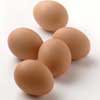
Eggs Cooking Recipes
Eggs are frequently in a wide variety of recipes. In addition delicious, eggs provide protein, vitamin A, riboflavin, and other vitamins and reserves, where the yolk contains all the fat, saturated fat, and cholesterol in an egg. Eggs are an brilliant source of high-quality protein and are far less expensive than nearly all other animal-protein foods.
An egg can be cooking in many methods – boiled eggs, poached eggs, fried eggs, and scrambled eggs – and is also used as an ingredient in making, batters and cakes, etc.
Bird eggs are a common food and one of the most versatile ingredients used in cooking. They are important in many branches of the modern food industry. The most commonly used bird eggs are those from the chicken. Duck and goose eggs, and smaller eggs such as quail eggs are occasionally used as a gourmet ingredient, as are the largest bird eggs, from ostriches. Gull eggs are considered a delicacy in Great Britian, as well as in some Scandinavian countries, particularly in Norway.
For those who do not consume eggs, alternatives used in baking include other rising agents or binding materials, such as ground flax seeds or potato flour. Tofu can also act as a partial binding agent, since it is high in lecithin due to its soy content. Applesauce can be used, as well as arrowroot and banana. Extracted soybean lecithin, in turn, is often used in packaged foods as an inexpensive substitute for egg-derived lecithin.
Other egg substitutes are made from just the white of the egg for those who worry about the high cholesterol and fat content in eggs. These products usually have added vitamins and minerals as well as vegetable-based emulsifiers and thickeners such as xanthan gum or guar gum. These allow the product to maintain the nutrition and several culinary properties of real eggs, making possible foods like Hollandaise sauce, custard, mayonnaise, and most baked goods with these substitutes.